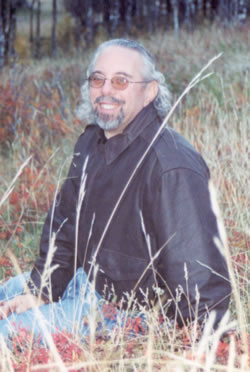Digging The Graves Grow Bigger...
Jared Smith portrays the gritty reality of the modern American Dream in his latest book, The Graves Grow Bigger Between Generations (Higganum Hill Books 2008). His heartfelt, bare-knuckled imagery sticks with you like a warm bowl of stew. His command of language consistently startles you like a wet sheet popping in a summer wind. Sometimes stark, sometimes gentle, Jared makes what is real more real, makes vivid what is hidden, and finally sets us back on our own feet to find our own way.
The opening poem of the volume, "A Silver Zipper," invites us each to look inside:
Whatever is hidden burns brightest
when the time of counting shadows end.
This poem introduces one of the major themes of the volume: how we all strive to beat our own mortality, and how all humans intuitively sense there is something more than the years we have here. It suggests there is an innate greatness to living that endures beyond the things we make and build in our own time:
Most of life is waiting for what comes in.
Most of what comes in was here before.
Beyond the buildings are estuarine islands
where a tall bird waits expectantly.
In the haunting, vernacular, title poem, "The Graves Grow Bigger Between Generations," Jared weaves history and legend to further develop this theme.
I swear I'm going to remember this, and forget the graves,
and forget the markers and forget the names, but I'm going to remember
the smell of furniture polish on old oak banisters, and the dust of books,
and the coolness of old stone buildings in sleepy towns on summer days.
I'm going to remember the too bright eyes of small blonde girls
with their forced bright smiles in silent public rooms and archives
and I'm going to keep on rolling along across America unmarked,
taking the hand of each one and sweeping her off her feet,
making love with each one at the least expected time
and filling my heart with her smile and with her memory
because there is nothing larger than this that I can imagine:
the depth of shadowed rooms, a silent ray of light, purple flowers
and a woman's touch. The graves get ever bigger
from one generation unto the next.
Through this blue collar, grayscale narrative, Jared reveals a profoundly black and white truth. It is how we live that is important, not how we die.
Having so epically explored our fascination with immortality, Jared turns his pen to our difficult relationship with nature. In "Life at the Margins," he notes the irony that no matter how much damage humans do to nature, we will always be integrally linked.
We are a part of so much that is born of sun,
even as we roll away into the watch of space
devoid of hope. The shadows too are lighted.
Jared quickly expands this irony to include how human society invariably damages our own nature. In "Having Never Wanted To Own The Business," he brilliantly describes our human compulsion to own what we do with the metaphor of working away our lives trying to run a business.
A man is 26 miles of intestine stretched above a desk,
running multiple times to the snack machine and urinals,
a sensory input in an electronic web of phone calls to the infinite.
My years are gone.
Once again Jared looks to the strange miracle of our existence for an answer. In "To Be Alive," Jared articulates our situation with the words:
because what else are you going to do with
a universe when all its guts are emptied out.
He then humbly placates our plight with:
I too wish I knew what to do and how to cope,
and sometimes I think that in itself is enough
to be alive.
Throughout this manuscript, Jared challenges the poet to deal with modern societies' major issues. As we travel his landscape of sinew and gears, of transparent shadow and unifying light, we soon realize that, for Jared, it is imperative that culture live up to its responsibility, that poets have a sacred duty to lead us out of the all consuming cycles of self-poisoning and emptiness. Jared throws down his gauntlet to contemporary poets in his poem, "Why Put Up With This Anymore?"
there are ultimately no others who can come before you
whether it is by spoken words or written ones, Poet,
I cannot understand why you hang your head down
and skulk in alleys eating poverty with your words.
In this collection Jared swims through the complex floods of modern life, bobs with the joys and heartbreaks of love, and reaches for the glittering surface above greed and regret. He treads in a world of concrete and flowers, of wires and sunsets, of metal and bees, with the grace and vision of a poet seeking only the truth simply put.
It's not like street yard baseball, this poetry thing anymore,
where you used to lean back with whatever piece of wood you found
lying around and hit each clunker of coal as far as it would go.
With The Graves Grow Bigger Between Generations, Jared Smith has hit one out of the park!
Labels: book, Graves Grow Bigger Between Generations, Jared Smith, M. D. Friedman, poetry, Review


1 Comments:
your great
Post a Comment
<< Home